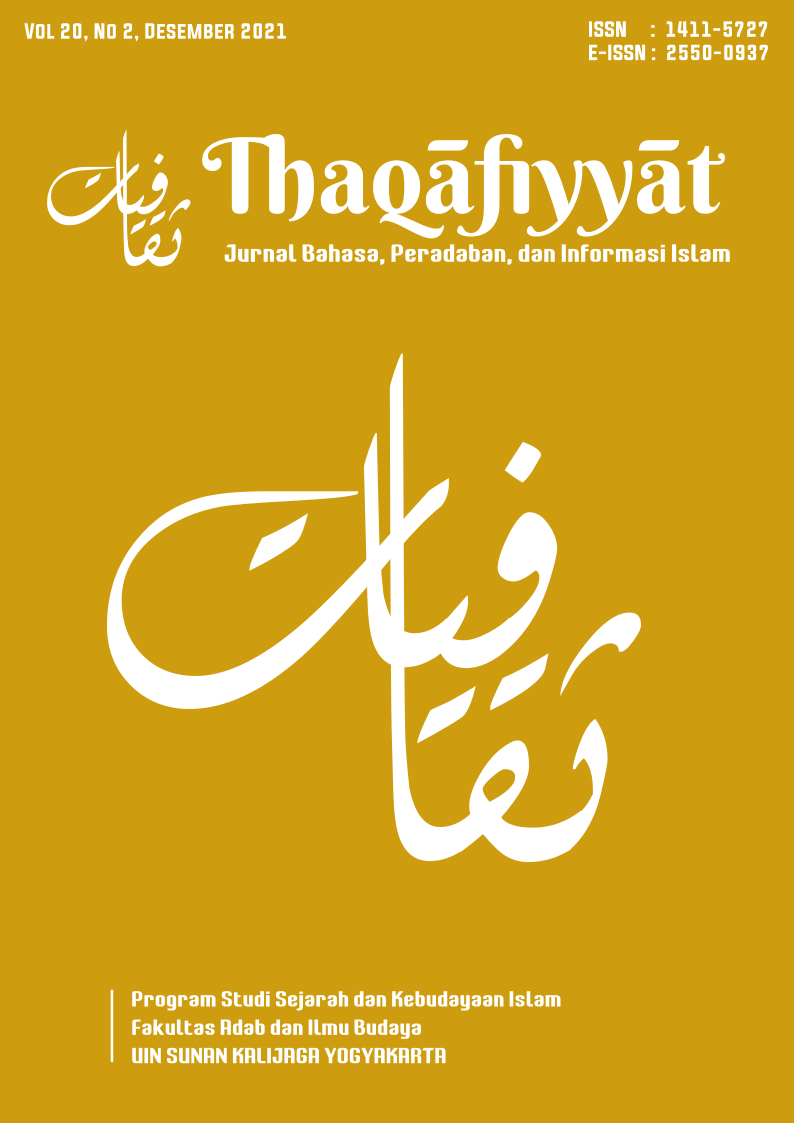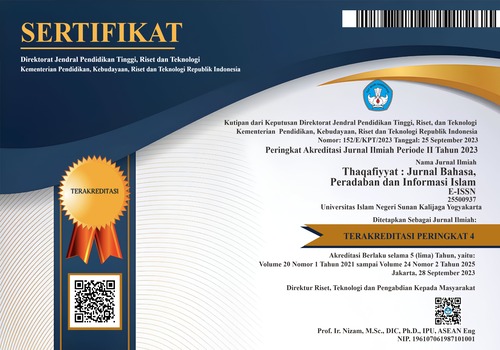PERKEMBANGAN DEMOKRASI DI TUNISIA
DOI:
https://doi.org/10.14421/thaq.2021.20204Keywords:
Tunisia, Arab Spring, Demokrasi IslamAbstract
Abstract: This paper discusses the development of democracy in Tunisia. The goal is to understand the development of Tunisian democracy which is full of dynamics of the effects of the Arab Spring. This research uses the library method. Data collection through journals and books. The results of this study found that the long journey of the Tunisian people, in achieving independence from the occupation of the Tunisian government itself, was a road that was not easy, steep and sharp. Many became victims, in the name of the revolution. Both physically and psychologically. However, the struggle is carried out not only in the name of religion but also human humanity at stake, the rights and obligations desired by the Tunisian people, who become their driving force in their journey to achieve a democratic government. Of course, this requires a sacrifice in the long journey of democracy in Tunisia. Although in some Middle Eastern countries the process of democratization is still uncertain, Tunisia is not. Tunisia has become a hope for countries in the Middle East to rise from adversity. Tunisia has successfully held elections to democratically appoint a leader. Tunisian democracy is getting better with the inauguration of a new constitution that provides equality between men and women so that Tunisia becomes a pioneer of feminism in the Middle East. Although we cannot compare it with other contexts of Islamic government, Tunisia is a system that continues to rise to renew the slump of democracy by removing the influence of secular, far-right ideologies, and the monarchical system. Therefore, the political dynamics of the state system is a transition period whether it will lead to destruction or even towards democratic maturity, thus there is still optimism for the implementation of Islamic democracy in the Tunisian government system in the midst of all the dynamics that are faced.
Abstrak: Tulisan ini membahas perkembangan demokrasi di Tunisia. Tujuannya untuk memahami perkembangan demokrasi Tunisia yang sarat dengan dinamika dampak Arab Spring. Penelitian ini menggunakan metode kepustakaan. Pengumpulan data melalui jurnal dan buku. Hasil penelitian ini menemukan bahwa perjalanan panjang rakyat Tunisia dalam mencapai kemerdekaan dari penjajahan pemerintah Tunisia sendiri merupakan jalan yang tidak mudah, terjal dan tajam. Banyak yang menjadi korban, atas nama revolusi. Baik secara fisik maupun psikis. Namun, perjuangan tersebut dilakukan tidak hanya atas nama agama tetapi juga kemanusiaan manusia yang dipertaruhkan, hak dan kewajiban yang diinginkan oleh rakyat Tunisia, yang menjadi pendorong mereka dalam perjalanan mencapai pemerintahan yang demokratis. Tentu saja, ini membutuhkan pengorbanan dalam perjalanan panjang demokrasi di Tunisia. Meski di beberapa negara Timur Tengah proses demokratisasi masih belum pasti, Tunisia tidak demikian. Tunisia menjadi harapan bagi negara-negara di Timur Tengah untuk bangkit dari keterpurukan. Tunisia telah berhasil mengadakan pemilu untuk menunjuk seorang pemimpin secara demokratis. Demokrasi Tunisia semakin baik dengan diresmikannya konstitusi baru yang memberikan kesetaraan antara laki-laki dan perempuan sehingga Tunisia menjadi pelopor feminisme di Timur Tengah. Meski tidak bisa kita bandingkan dengan konteks pemerintahan Islam lainnya, Tunisia adalah sistem yang terus bangkit untuk memperbaharui keterpurukan demokrasi dengan menghilangkan pengaruh ideologi sekuler, sayap kanan, dan sistem monarki. Oleh karena itu, dinamika politik sistem negara merupakan masa transisi apakah akan menuju kehancuran atau bahkan menuju kedewasaan demokrasi, sehingga masih ada optimisme penerapan demokrasi Islam dalam sistem pemerintahan Tunisia di tengah segala dinamika yang ada. dihadapi.
Downloads
References
Abdillah, Masykuri, and Wahid Wahab. Demokrasi Di Persimpangan Makna : Respons Intelektual Muslim Indonesia Terhadap Konsep Demokrasi (1966-1993). 1st ed. Yogyakarta: PT Tiara Wacana, 1999.
Adib, Muhammad, and Nur Qomari. “Arus Baru Politik Islam : Pluralisme, Kontestasi, Dan Demokratisasi.” Maqashid 1, no. 2 (2008).
Ahmad, Nazeer. “The 2011 Arab Revolution.” Accessed January 28, 2013.
wwwthehistoryofislam.com.
Al Hamzah, Zaky. “Konstitusi, Sejarah Baru Tunisia.” Last modified 2014. Accessed April 22, 2019.
https://www.republika.co.id/berita/koran/newsupdate/14/01/27/n02b9d-konstitusi-sejarah-barutunisia.
Aulia, Muhammad Lili Nur. “Pelajaran Besar Dari Tunisia Untuk Demokrasi.” Last modified 2020. https://www.republika.co.id/berita/qewkxz412/pelajaran-besar-dari-tunisia-untuk-demokrasi.
Ayoob, Mohammed. The Many Faces of Political Islam Religion and Politics in the Muslim World. Ann Arbor: The University of Michigan Press, 2008.
Azra, Azyumardi. Konflik Baru Antar Peradaban : Globaliasi, Radikalisme, & Pluralisme. 1st ed. Jakarta: Divisi Buku Perguruan Tinggi, RajaGrafindo Perkasa, 2002.
Burdah, Ibnu. Islam Kontemporer : Revolusi Dan Demokrasi. 1st ed. Malang: Intrans Publishing, 2014.
Darmawan, Arief Bakhtiar. “Islam Dan Perilaku Politik Di Timur Tengah” (n.d.): Insignia Journal of International Relation.
Denoeux, Guilain. “The Forgotten Swamp : Navigating Political Islam.” Middle East Policy IX, no. 2 (2022).
Ghafur, Muhammad Fakhry. “Agama Dan Demokrasi : Munculnya Kekuatan Politik Islam Di Tunisia, Mesir, Dan Libya.” Jurnal Penelitian Politik 11, no. 2 (2016).
Mutakin, Ali. “ISLAM DAN DEMOKRASI : Kajian Fiqih Siyasah Tentang Tantangan Dan Hambatan.” Jurnal Al- Ashriyyah (2019).
Roy, Oliver. The Failure of Political Islam. Massacusset: Harvard University Press, 1994.
Sahide, Ahmad. Gejolak Politik Timur Tengah (Dinamika, Konflik Dan Harapan). Yogyakarta: The Phinisi Press, 2017.
Sahide, Ahmad, and other. “The Arab Spring : Membaca Kronologi Dan Faktor Penyebabnya.” Jurnal Hubungan International 4, no. 2 (2015).
Yasmine, Shafira Elnanda. “Arab Spring : Islam Dalam Gerakan Sosial Dan Demokrasi Timur Tengah.” Masyarakat, Kebudayaan, dan Politik 28, no. 2 (2016).
Yon, Machmudi, Riyan Hidayat, and Elia Agustina. Sejarah Timur Tengah Kontemporer ; Kepemimpinan Di Arab Saudi Dan Libya. 1st ed. Jakarta: Penerbit Universitas Indonesia (UIPress), 2016.
“Roboh Seperti Teori Domino.” Accessed June 29, 2022. https://internasional.kompas.com/read/2011/01/23/06532377/Roboh.seperti.Teori.Domino.
Downloads
Published
Issue
Section
License
Copyright (c) 2022 Rinawati Acan Nurali

This work is licensed under a Creative Commons Attribution-NonCommercial-ShareAlike 4.0 International License.
Authors who will publish with this journal agree to the following terms:
- Thaqafiyyat: Jurnal Bahasa, Peradaban dan Informasi Islam publishes all articles entirely in full text.
- It is permissible for readers to download and to use it for scientific purposes and scientific dissemination.
- Authors retain copyright and grant the journal right of first publication with the work simultaneously licensed under a Creative Commons Attribution License that allows others to share the work with an acknowledgement of the work's authorship and initial publication in this journal.
- Authors are able to enter into separate, additional contractual arrangements for the non-exclusive distribution of the journal's published version of the work (e.g., post it to an institutional repository or publish it in a book), with an acknowledgement of its initial publication in this journal.
- Authors are permitted and encouraged to post their work online (e.g., in institutional repositories or on their website) prior to and during the submission process, as it can lead to productive exchanges, as well as earlier and greater citation of published work.









